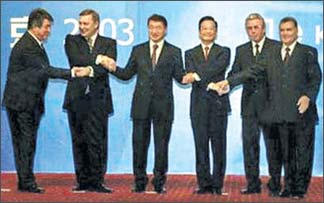SCO: Guided by Shanghai Spirit
|
Delegate status for Sri Lanka
Sri Lanka obtained delegate status at the recently concluded
Shanghai Cooperation Organized in Yekaterinburg, Russia
recently. |
|

Leaders of the SCO member countries - China, Russia, Kazakhstan,
Kyrgyzstan, Tajikistan and Uzbekistan |
Summit shows there is no alternative to international cooperation A
summit of the Shanghai Cooperation Organization, which has ended in
Yekaterinburg, adopted decisions that can seriously influence the
organization’s future.
The SCO was initially known as the Shanghai Five, a group set up by
China, Russia, Kazakhstan, Kyrgyzstan and Tajikistan in Shanghai in 1996
to promote trans-border cooperation. After Uzbekistan joined the group
in 2001, the organization addressed regional security issues.
Since then, the SCO has become an influential international
organization focusing on global issues, from energy security to
educational, social and cultural cooperation.
This unique organization is guided by the so-called “Shanghai
Spirit,” one of resistance to any form of confrontation, hostile
competition and disregard of each other’s interests.
More and more countries are keen on joining it, above all Iran, whose
president, Mahmoud Ahmadinejad, attended the extended meeting of the SCO
leaders despite the complicated political situation in his homeland.
Ahmadinejad spoke at the meeting about the SCO’s role in resolving
economic problems and positive changes in all spheres of its operation.
Possible enlargement of the SCO’s sphere of responsibility entails
the use of more complex mechanisms for attaining its goals. During the
ongoing global financial and economic crisis, the SCO should determine
its place in the system of international integration. While trying to
deal with arising challenges and risks, the SCO is also working to
strengthen its consolidation and to encourage more effective interaction
between its member states.
These principles have been sealed in the Yekaterinburg Declaration,
the main political document adopted at the summit. It also provides a
clear assessment of the current geopolitical and geoeconomic realities.
The key idea of the declaration is that there is no alternative to
international cooperation. The document also seals the member states’
commitment to the principles of peace based on equal security for all
countries without exception.
“We regard this meeting as the focal point of Russia’s presidency of
the SCO,” Russian President Dmitry Medvedev said in Yekaterinburg.
“Active participation in the organization’s efforts, and the development
of multifaceted cooperation within it, have long become the priorities
of Russia’s foreign policy.” The summit considered the proposals of the
Russian and Kazakh leaders to develop cooperation in the financial
sphere and create a common supranational currency for the SCO countries.
“Using a national currency as a regional and global reserve currency
is an obsolete scheme that gives the country in question unilateral
advantages,” said Kazakh President Nursultan Nazarbayev.
This seems like a very good idea, but are the SCO countries ready to
implement it? Arkady Dvorkovich, an economic aide to the Russian
president, has said more than once that it would be premature to
consider a common monetary unit for the SCO because of considerable
structural and development differences between the economies of its
member states.
However, the summit participants welcomed the proposal of the Kazakh
president.
It was announced in Yekaterinburg that Belarus and Sri Lanka would be
granted partner status, and that a package of documents would be adopted
soon to regulate the admission of new members. The SCO summit also
discussed one of the most distressing problems, the Afghan conflict.
Uzbek President Islam Karimov reaffirmed his country’s proposal on
changing the format of peacekeeping efforts in Afghanistan.
In his view, the UN Contact Group for Afghanistan should include the
six states bordering on Afghanistan, the United States, Russia and NATO.
The Uzbek president said that the new contact group could become a major
consultative body facilitating conciliation in Afghanistan and the
surrounding region.
And so, the SCO summit in Yekaterinburg has strengthened the
organization’s stance as a collective international player, and showed
that the SCO leaders address all global problems. Time will show how
much the possible expansion of the zone of their responsibility will
benefit the organization.
Currently, the underlying principles of the SCO boil down to a
mutually acceptable ideology of interaction, uniting the countries which
are prepared for constructive and equal cooperation. In this sense, the
Shanghai Cooperation Organization has no alternative. |



